The 3rd Sustainable Consumption Forum successfully held
2023-04-20GoldenBeeGoldenBee0
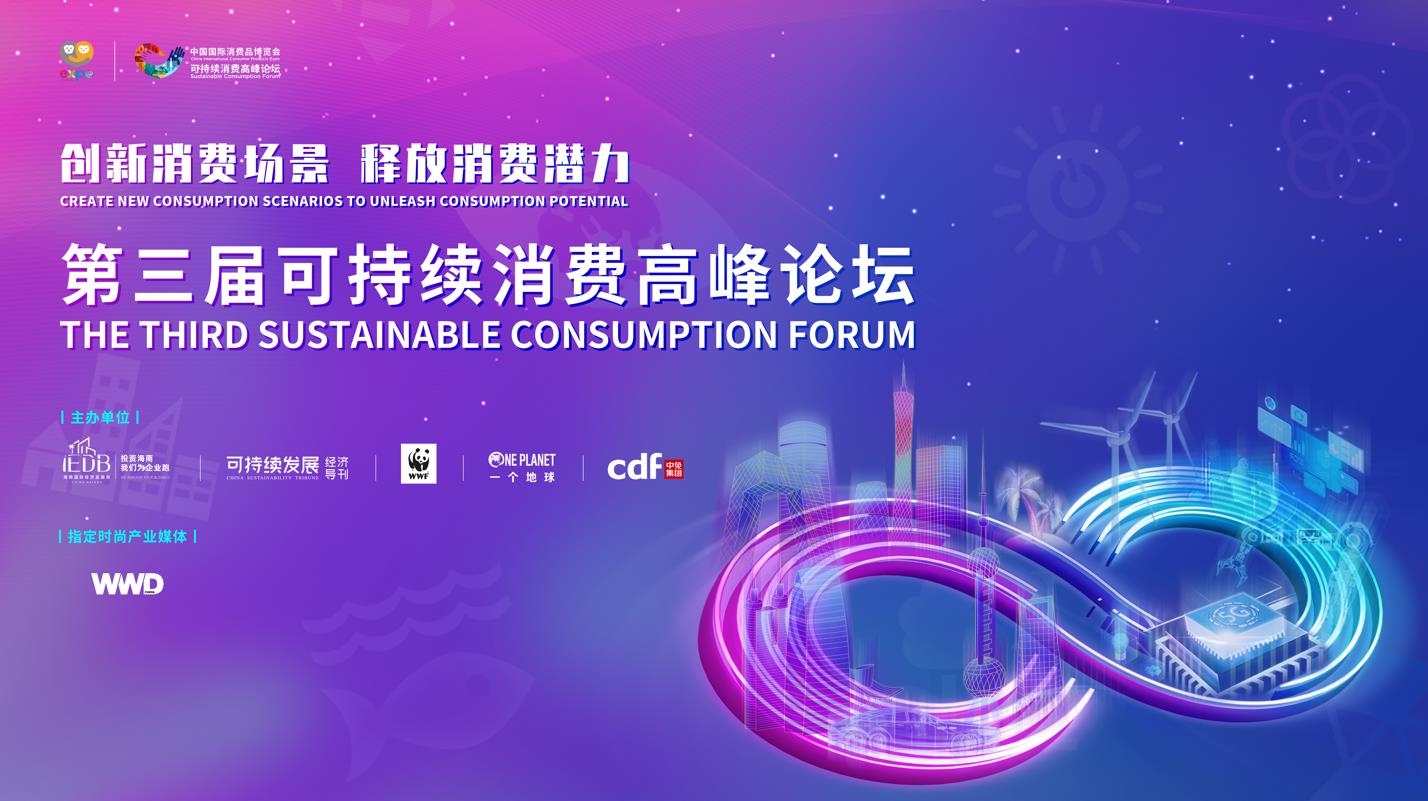
On April 12, 2023, the 3rd Sustainable Consumption Forum was successfully held at the 3rd China International Consumer Products Expo (CICPE) in Haikou, Hainan Province, with the theme of "Create New Consumption Scenarios, Unleash Consumption Potential". The forum was co-hosted by China Sustainability Tribune, Hainan Provincial Bureau of International Economic Development (Hainan IEDB), World Wide Fund for Nature (WWF), Shenzhen One Planet Foundation, and China Tourism Group Duty Free Corporation Limited (hereinafter referred to as "CTG Duty Free"). Women’s Wear Daily China (WWD China) was the designated media in fashion industry.
Accelerating sustainable consumption is not only necessary for high-quality economic development, but also an inherent requirement for achieving the harmonious coexistence between people and nature. It is also highly consistent with consumers’ needs for a better life and common prosperity. At the same time, green and sustainable consumption is stimulating new industries and business models, thus has unleashed consumption potential and promoted consumption upgrading and development.
In this context, the forum gathered government, professional institutions, international organizations, experts and scholars, famous brands and media to discuss the new trends, policies and practices of green and sustainable consumption in China through the national exhibition of CICPE.
Upholding the concept of "green exhibition", the 3rd CICPE and the 3rd Sustainable Consumption Forum both achieved carbon neutrality and were awarded certificates.
Sustainable consumption promotes consumption upgrading
In the welcoming address, An Baojun, Deputy Director of the Department of Market Operation and Consumption Promotion, Ministry of Commerce of People’s Republic of China (MOFCOM), affirmed that the 20th CPC National Congress highlighted the need to expand domestic demand, enhance the fundamental role of consumption in economic development, advocate green consumption, and promote green and low-carbon lifestyles and production. In this "year to boost consumption" defined by the MOFCOM, a variety of green consumption activities nationwide in the field of new energy vehicles, second-hand vehicles, and green construction are ongoing to facilitate green and sustainable consumption. Leveraging the platform of CICPE and the 3rd Consumption Forum, all parties could jointly bring innovation and solutions to consumption upgrading and high-quality economic development.
Song Qisen, Director of the Department of Consumer Products, the Ministry of Industry and Information Technology (MIIT), pointed out the significant role of consumer products industry in China's traditional retail industry with respect to its functions in safeguarding people’s livelihood, meeting consumer demand and boosting economic growth. Since 2022, MIIT has organized a series of national activities to improve the supply capacities of consumer products and services. Combining the development trends of the industry, he proposed three major areas of work: innovating in products to lead the consumption upgrading; boosting consumer confidence through improving supply capacities; and promoting consumption growth through increased products variety, improved products quality, and brand innovation.
Huang Cui, Deputy Director of Hainan IEDB, hoped that organizations and enterprises jointly promote green consumption through this platform. She was pleased to see that increasing number of international enterprises and brands had integrated sustainability into their own development strategies and practices, promoted sustainable and green development through branding, events, and reporting, and led the trend of consumption.
Wang Yanguang, Deputy General Manager of CTG Duty Free shared their ESG practices. He introduced achievements of Haikou International Duty Free City of the China Duty Free Group (CDFG) in boosting consumption and economic growth and experiences in carbon emissions trading. Moreover, CDFG offset 35 tons of carbon emissions through carbon emissions trading certified by Gruanzhou Emissions Exchange (GEEX), which contributes to realizing carbon neutrality for this forum.
Song Qisen, Director of the Department of Consumer Products, the Ministry of Industry and Information Technology (MIIT), pointed out the significant role of consumer products industry in China's traditional retail industry with respect to its functions in safeguarding people’s livelihood, meeting consumer demand and boosting economic growth. Since 2022, MIIT has organized a series of national activities to improve the supply capacities of consumer products and services. Combining the development trends of the industry, he proposed three major areas of work: innovating in products to lead the consumption upgrading; boosting consumer confidence through improving supply capacities; and promoting consumption growth through increased products variety, improved products quality, and brand innovation.
Huang Cui, Deputy Director of Hainan IEDB, hoped that organizations and enterprises jointly promote green consumption through this platform. She was pleased to see that increasing number of international enterprises and brands had integrated sustainability into their own development strategies and practices, promoted sustainable and green development through branding, events, and reporting, and led the trend of consumption.
Wang Yanguang, Deputy General Manager of CTG Duty Free shared their ESG practices. He introduced achievements of Haikou International Duty Free City of the China Duty Free Group (CDFG) in boosting consumption and economic growth and experiences in carbon emissions trading. Moreover, CDFG offset 35 tons of carbon emissions through carbon emissions trading certified by Gruanzhou Emissions Exchange (GEEX), which contributes to realizing carbon neutrality for this forum.
New members of the Global Sustainable Consumption Initiative
Two new members, Perfect World Investment & Holding Group (hereinafter referred as Perfect World) and China CITIC Bank Credit Card Center, joined the Global Sustainable Consumption Initiative, adding the number of its partners to 14.
The Initiative was launched at the first CICPE in 2021 by China Sustainability Tribune in collaboration with companies that have been engaged in sustainable development for many years and have proactively promoted sustainable consumption, with the participation of Dell Technologies, Sateri, Nestlé, Visa, L'Oréal China, China Resources Snow Breweries, JD Logistics, Lee Kum Kee, M&G, Trip.com Group Limited, Perfect World, China CITIC Bank Credit Card Center, and GoldenBee Branding, etc. The Initiative has received guidance and support from the Department of Consumer Market Operation and Consumption Promotion of the MOFCOM and the Hainan IEDB, as well as wide recognition from the media and consumers.
The Initiative was launched at the first CICPE in 2021 by China Sustainability Tribune in collaboration with companies that have been engaged in sustainable development for many years and have proactively promoted sustainable consumption, with the participation of Dell Technologies, Sateri, Nestlé, Visa, L'Oréal China, China Resources Snow Breweries, JD Logistics, Lee Kum Kee, M&G, Trip.com Group Limited, Perfect World, China CITIC Bank Credit Card Center, and GoldenBee Branding, etc. The Initiative has received guidance and support from the Department of Consumer Market Operation and Consumption Promotion of the MOFCOM and the Hainan IEDB, as well as wide recognition from the media and consumers.
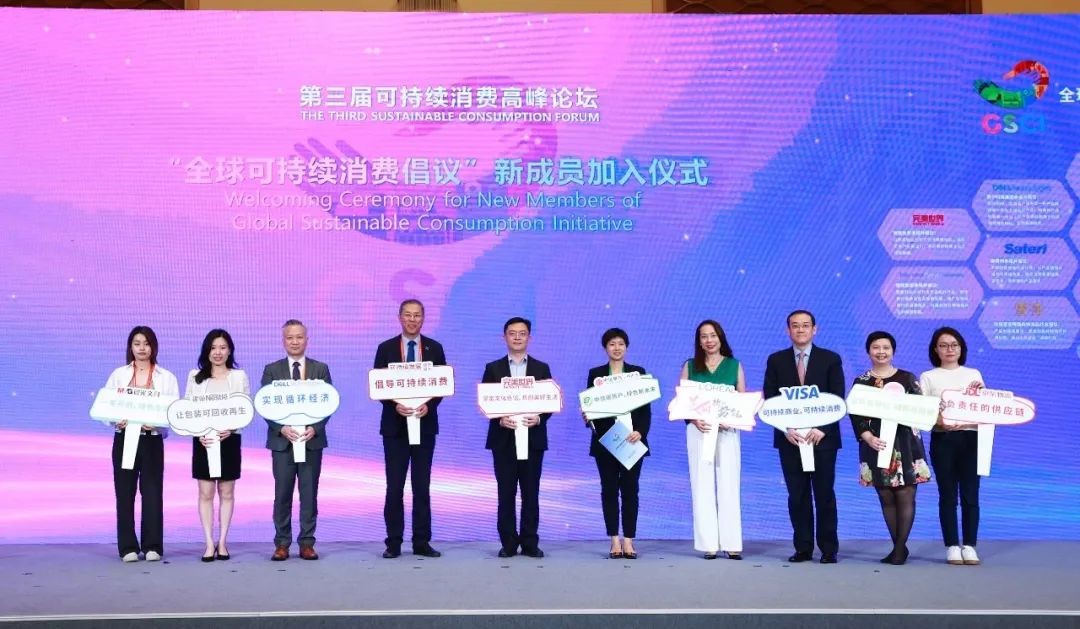
The Initiative adopts a "1+N" model. The "1" principle initiative includes strengthening top-level design; providing sustainable products and services; communicating sustainability messages to consumers; fostering a sustainable consumption culture; paying attention to the consumption needs of special groups; and collaborating with multiple parties to create a social atmosphere and promote policy mechanisms. "N" stands for initiatives and commitments of each brand in their respective areas of sustainable consumption and production.
Yu Zhihong, President and Editor-in-Chief of China Sustainability Tribune, introduced the progress of the Initiative in the past year regarding the research on sustainable consumption, low-carbon technologies, product innovation, and good practices. The Global Sustainable Consumption Initiative will strengthen its actions in the areas of research, case studies, communication platforms and partnerships. Meanwhile, it strives to scale up the visibility of CICPE and lead the global sustainable consumption”, he said.
Yu Zhihong, President and Editor-in-Chief of China Sustainability Tribune, introduced the progress of the Initiative in the past year regarding the research on sustainable consumption, low-carbon technologies, product innovation, and good practices. The Global Sustainable Consumption Initiative will strengthen its actions in the areas of research, case studies, communication platforms and partnerships. Meanwhile, it strives to scale up the visibility of CICPE and lead the global sustainable consumption”, he said.
Fruitful results in sustainable development
Companies and organizations presented new achievements and new research results for sustainable transitions in related industries.
To address the demand for greater transparency, L’Oréal developed the Product Environmental and Social Impact Labeling System and launched it for the first time at the 3rd CICPE in China region. The system can rate products on a five-point scale from A to E, allowing consumers to better understand the environmental and social impact of products throughout their lifecycle. The system has been applied to Biotherm products of L'Oréal.
Poly Culture Group shared the experiences in upgrading consumption model in cultural industry, focusing on innovating in digital development model for cultural industry, developing new business of digital arts, facilitating the construction of a platform for digital operation and management, exploring the traditional cultural value, and improving the added value of artworks.
Wang Yalin, Program Officer of United Nations Development Programme (UNDP) China, pointed out the significant role of sustainable tourism cities in achieving sustainable development goals. Particularly, she illustrated their benefits in enhancing the vitality of urban economic development, creating job opportunities, reducing the gap between rich and poor, and improving the harmony between urban ecological protection and economic development.
Written by China Sustainability Tribune and exclusively supported by Visa, the Guiding Principles for Promoting Sustainable Consumption in Urban Business Districts provides an in-depth analysis of the meaning and value of sustainable consumption and proposes action principles and directions to promote sustainable consumption in urban business districts.
The United Nations Intergovernmental Panel on Climate Change (IPCC) recently released its Sixth Assessment Report (AR6), renewing the urgent call for rapid and far-reaching changes across all sectors of the economy to ensure that global warming is contained to 1.5°C by the end of the century. NielsenIQ's research finds that climate change will drive brands to implement sustainable business models and proposes 10 steps for brands to accelerate sustainable change.
In a recent Roland Berger survey of fashion brand executives, nearly 90% of brands/companies are willing to integrate sustainability into their internal culture, management and business development. Six major areas of concern for brand sustainability were given, including whole-chain planning, reputation investment, design, communication, patterns, and digital future.
The first China International Consumer Products Expo Sustainability Report released by Ernst & Young (EY) showcased the impact of the CICPE in promoting the sustainable consumption upgrading and green development, so as to accelerate the green and low-carbon circular economic development system in Hainan Province and the country as a whole.
Branding practices to facilitate sustainable consumptionTo address the demand for greater transparency, L’Oréal developed the Product Environmental and Social Impact Labeling System and launched it for the first time at the 3rd CICPE in China region. The system can rate products on a five-point scale from A to E, allowing consumers to better understand the environmental and social impact of products throughout their lifecycle. The system has been applied to Biotherm products of L'Oréal.
Poly Culture Group shared the experiences in upgrading consumption model in cultural industry, focusing on innovating in digital development model for cultural industry, developing new business of digital arts, facilitating the construction of a platform for digital operation and management, exploring the traditional cultural value, and improving the added value of artworks.
Wang Yalin, Program Officer of United Nations Development Programme (UNDP) China, pointed out the significant role of sustainable tourism cities in achieving sustainable development goals. Particularly, she illustrated their benefits in enhancing the vitality of urban economic development, creating job opportunities, reducing the gap between rich and poor, and improving the harmony between urban ecological protection and economic development.
Written by China Sustainability Tribune and exclusively supported by Visa, the Guiding Principles for Promoting Sustainable Consumption in Urban Business Districts provides an in-depth analysis of the meaning and value of sustainable consumption and proposes action principles and directions to promote sustainable consumption in urban business districts.
The United Nations Intergovernmental Panel on Climate Change (IPCC) recently released its Sixth Assessment Report (AR6), renewing the urgent call for rapid and far-reaching changes across all sectors of the economy to ensure that global warming is contained to 1.5°C by the end of the century. NielsenIQ's research finds that climate change will drive brands to implement sustainable business models and proposes 10 steps for brands to accelerate sustainable change.
In a recent Roland Berger survey of fashion brand executives, nearly 90% of brands/companies are willing to integrate sustainability into their internal culture, management and business development. Six major areas of concern for brand sustainability were given, including whole-chain planning, reputation investment, design, communication, patterns, and digital future.
The first China International Consumer Products Expo Sustainability Report released by Ernst & Young (EY) showcased the impact of the CICPE in promoting the sustainable consumption upgrading and green development, so as to accelerate the green and low-carbon circular economic development system in Hainan Province and the country as a whole.
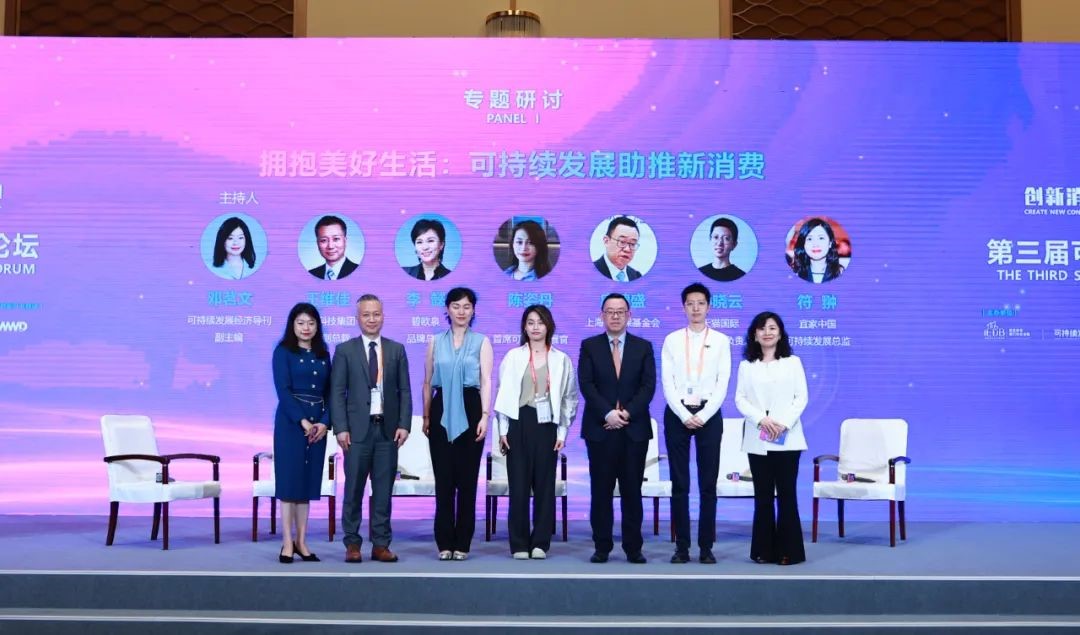
Deng Mingwen, Deputy Editor-in-Chief of China Sustainability Tribune moderated the first panel discussion of "Embracing a Better Life: Sustainable Development Boosts New Consumption”. Representatives from Dell Technologies, Biotherm, M&G, Tmall Global, Shanghai Consumer Foundation, and IKEA demonstrated their practices in responding to the trends of sustainable consumption.
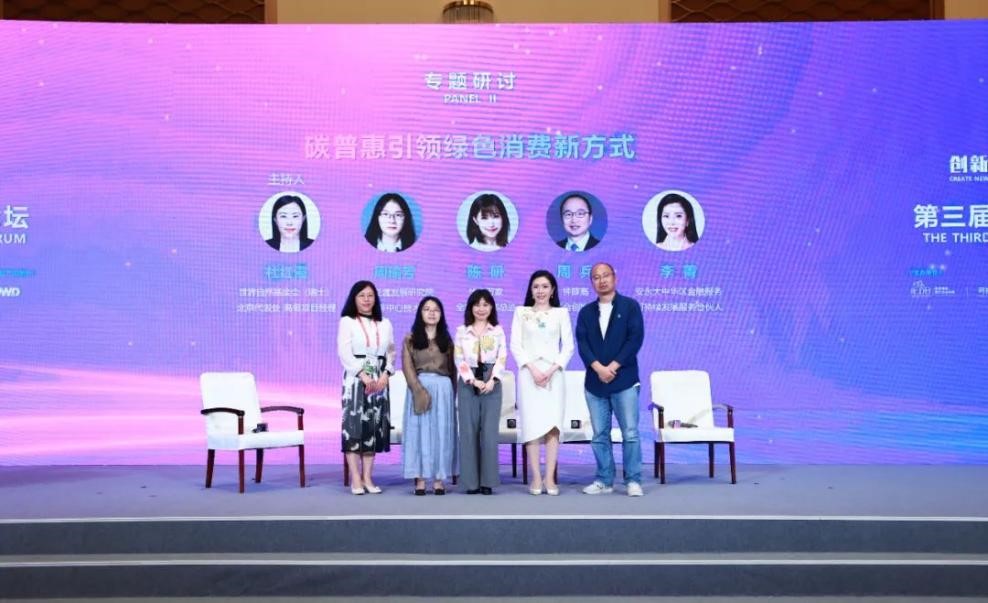
In the second panel discussion, "Carbon Inclusion Leads to Green Consumption" moderated by Du Hongxia, Senior Manager of WWF Beijing, representatives from Beijing Transport Institute, CP Group, CR Vanguard, Zhongxuegao, and EY discussed how to use digitalization and consumer finance to innovate in application scenarios of carbon inclusion and build a carbon inclusion mechanism for multiple participants to build and share.
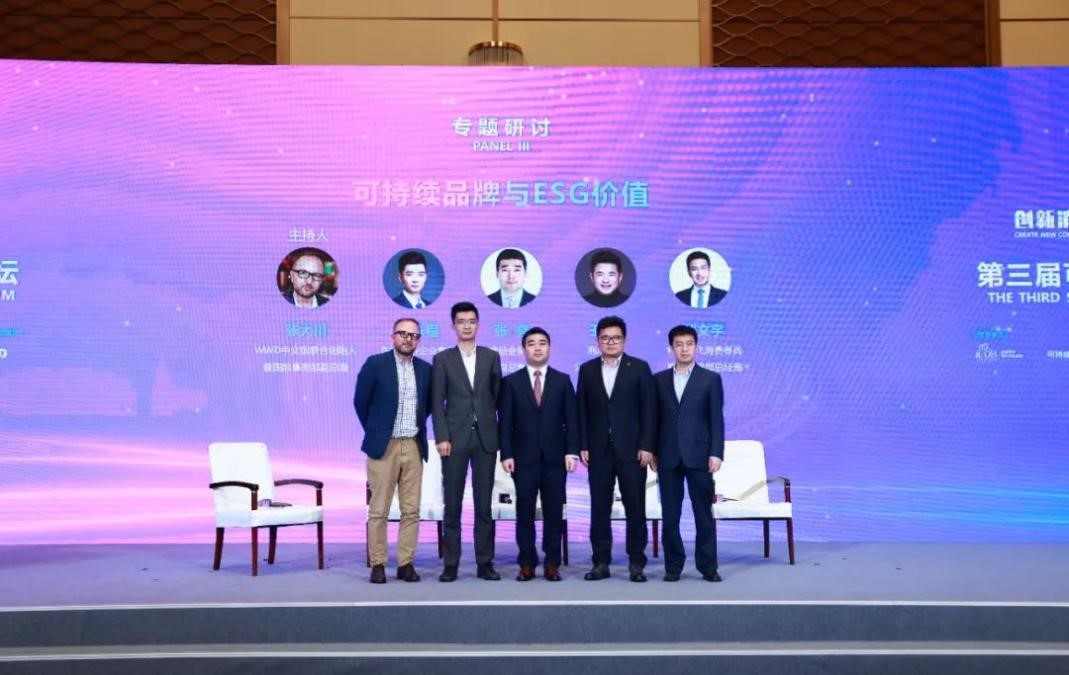
The third panel of "Sustainable Brands and ESG Values" was moderated by Johannes Neubacher, Co-Founder, VP and Chief Content Officer of WWD China. In this session, the Oriental Beauty Valley, POP MART, iFLYTEK, VIP.com and other brands shared their ESG practices and achievements, particularly on translating the ESG concepts into concrete business growth and sustainable socio-economic development, and on how ESG help improve brand image and investment.
(Presentations of the speakers are summarized from the forum meeting notes.)
Source: China Sustainability Tribune
Best Practices
- The 100-year brand — Air Liquide also has a sense of juvenile
- Beijing Public Transportation Corporation: Developing green transportation to build a harmonious and livable capital
- CGN: Building a modern factory in barren deserts and developing a new win-win cooperation model along “Belt and Road”
Upcoming Event

All the materials on the site “Source: XXX (not from this site)” have been reprinted from other media. They do not imply the agreement by the site.
All the materials with “Source: CSR-China Website” are the copyright of CSR-China Website. None of them may be used in any form or by any means without permission from CSR-China Website.
GoldenBee Official WeChat
Copyright © Csr-china.net All Right Reserved.
京ICP备19010813号










